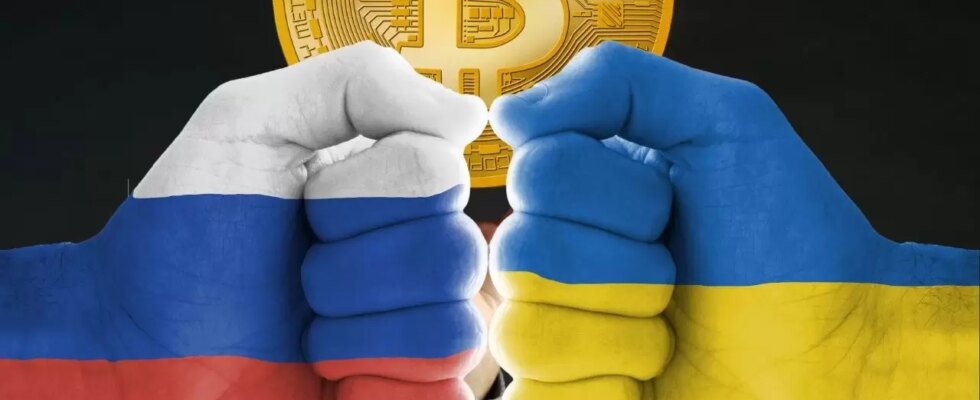How bitcoin donations are helping Ukraine and were to be careful
With the call for donations for cryptocurrencies, the Ukrainian government broke new ground over the weekend. Anyone wishing to support the country and its people can donate Bitcoin, Ethereum and the dollar-based cryptocurrency USDT, Ukraine’s official Twitter account reported on Saturday. In addition, two addresses were listed to which the crypto donations can be transferred. The minister for Digital Transformation, Mykhailo Fedorov, also shared the call.
186 Bitcoin and 2,477 Ethereum
After crypto assets worth several million dollars were collected in the first few hours, the donations to the Bitcoin and Ethereum address alone have grown to almost 15 million dollars. As the STANDARD was able to understand via the publicly visible transaction list of the blockchain, the government has collected around 186 Bitcoin and 2,477 Ether so far.
More than 16,000 individual transactions have arrived at the two addresses since it was called up a few days ago. In addition, most of the crypto donations collected are skimmed off from the two wallets at regular intervals.
Donations are also accepted in Polkadot.
On Tuesday, the government also announced that it would accept donations of the cryptocurrency Polkadot and published a corresponding address on Twitter. Since the transaction fees are significantly lower than Bitcoin and Ethereum, this cryptocurrency is better suited for smaller amounts. The Ukrainian leadership also used the message to thank the crypto community for their willingness to help.
The “official” government addresses are not the only ones to donate crypto money to Ukraine. Another ten million dollars were transferred to the Ukrainian organization Come Back Alive, collecting funds to train and strengthen the Ukrainian army since Russia annexed the Crimea peninsula in 2014. However, the original appeal on the crowdfunding site Patreon was turned off because the US platform prohibits funding for war activities.
Pussy Riot promotes the NFT flag.
It is also collected with the sale of the Ukraine flag as an NFT. The current bid is 1,103 Ether ($3.2 million), and the total donation pool has so far raised 1,535 ETH (over $4.5 million). The Russian punk band Pussy Riot, which has always been critical of Putin, is a co-initiator and announced the sale of the NFT on Twitter. A corresponding website has also been set up at “ukrainedao.love”. All donations are intended to benefit civilians and humanitarian causes.
The fact that a war on European soil will become the first significant test for cryptocurrencies to prove their usefulness in practice is seen by many in the crypto community as a sad irony of fate. Nevertheless, the market reacted euphorically on Monday, at least recouping virtually all losses since the outbreak of the war. Bitcoin rose to over 40,000 euros for the first time since the beginning of January and according to experts, Bitcoin price could increase further in coming months.
Beware of wrong addresses.
But there are also warning voices. Some fear that Russia could circumvent the sanctions by fleeing to cryptocurrencies. On the other hand, others urge caution when making transactions, as scammers can scam well-meaning donors via fake Twitter accounts and
Addresses posted through them.
Before making a transfer, you should check whether the Twitter account of the Ukrainian leadership or other people calling for donations is genuine and has not been hacked. If a call to an official account (donor must check white tick next to the account name) has been online for a long time and is also posted by other official government accounts, there is a good chance that the addresses are legitimate.
One has to be particularly careful on Twitter if the calls for donations in question appear in replies to any tweet. These are often slightly modified fake accounts intended to lure people into the trap with the same profile picture and slightly different account names. Therefore, people should compare the published addresses with other official calls to see whether the combination is correct.
Can Bitcoin evade Russian sanctions?
Cryptocurrencies are suitable for circumventing sanctions. But Russian owners of Bitcoin and Co can hardly get rid of more considerable sums in the West. Unlike stock exchanges, cryptocurrencies have quickly recovered from the shock of the Ukraine war. With a price of more than $44,500 for a bitcoin, the value has shot up. It increased by about a quarter since the low point at the outbreak of the war. Is this a reaction to the sanctions against Russia? Finally, cryptocurrencies, which do not require banks or the Swift communication system for transmission, can circumvent the sanctions.


